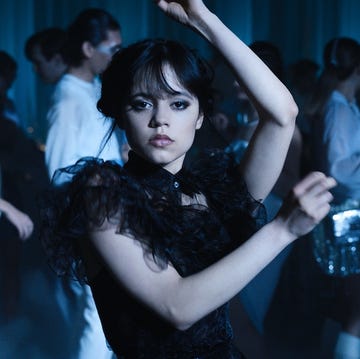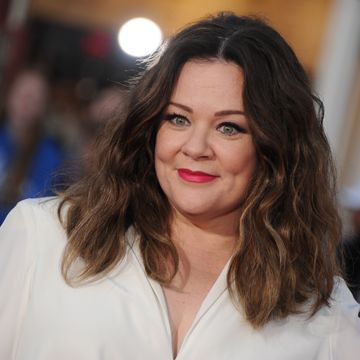Another day, another hashtag. SO many hashtags! And while it’s nice to see people rallying around various cause — When was the last time the world saw this many social and political protests? This much opinion? This many signs that people actually care? — it can all feel like noise. The kind that makes you want to give up on Twitter altogether.
Even though all the online chatter can be dizzying (see the rabbit hole of amazing hashtivism surrounding body confidence, for example), it’s usually clear and obvious when a cause is worth the time and energy, and there are quite a few. Here are the feminist hashtags that have defined the year so far, and most importantly will affect your life. Now go forth and engage.
#PeriodsAreNotAnInsult
Why you should care: Donald Trump is inarguably the political world’s biggest and most asinine troll. So it’s been pretty amazing to watch Twitter turn on the man who once called women ‘fat pigs’ over his crass and silly implication that Fox News host Megyn Kelly gave him a hard grilling at the GOP debate because she was on the rag. ‘You know, you could see there was blood coming out of her yes, blood coming out of her wherever,’ he told CNN of the debate, reducing the political stage to a playground full of emotionally stunted Tweens. The women of the Internets were rightly not having this and began live tweeting their periods at the presidential candidate. Thus, the hashtag #periodsarenotaninsult was born. My personal favourite:
How it affects you: It’s hard to believe anyone would take Trump seriously as a presidential candidate. And yet, he’s unbelievably still surging in the polls. But would you want a man who can’t handle a woman asking him hardball questions serving as the leader of the free world? That's what I thought.
#TheEmptyChair
Why you should care: When New York Magazine released its cover featuring 35 of Bill Cosby's sexual assault accusers, it was the empty chair, representing the 11 women who couldn't be photographed (and the multitudes of other women in the world who have been raped but are too afraid to come forward) that became the real talking point. This was mainly due to the American journalist Elon James who, in response to the cover, created the hashtag #TheEmptyChair, which became a rabbit hole of heart breaking real life sexual assault stories from women who had never come forward with their experiences before.
How it affects you: The faster we chip away at rape culture through campaigns like this, the closer we get to a safer environment for women everywhere.
#SayHerName
Why you should care: By now, you may have heard the news of Sandra Bland, a 28-year-old American woman who drove to Texas to interview for a new job only to later be found dead of an alleged hanging in her jail cell three days later. She had been arrested, violently, over a routine traffic stop. And now, the world is not surprisingly suspicious of the circumstances surrounding it. Months before, there was 14-year-old Dajjeria Becton being slammed to the ground by a police officer and dragged across a suburban lawn in front of a pool party in McKinney, Texas. The year has been full of headlines about police violence against black men in America (Kalief Browder, Eric Garner, Michael Brown, Walter Scott, the list goes on and on), but the names and stories of women who have been brutalised often gets lost. #SayHerName is making sure that doesn't happen.
How it affects you: #McKinney was one more example of how women — our voices, our names and our faces — get overshadowed. #SayHerName rightly redirects our focus, because police brutality affects black women just as disproportionately as it does black men.
#GirlsWithToys
Why you should care: This hashtag is only a few months old, but it’s already made the powerful statement that (hello!) we exist in the worlds of science, math and technology too. Kate Clancy, an assistant professor of anthropology at the University of Illinois started the Twitter campaign after hearing a CalTech professor refer to scientists as ‘boys with toys’ on America's National Public Radio and making plain the gender bias that keeps women from entering STEM fields in the first place. And let us not forget #distractinglysexy, which was used oh so efficiently last month to protest Tim Hunt’s ridiculous claim that women in the lab are a bother because they: “Fall in love with you and when you criticise them they cry." Runners up: #WomeninSTEM and my personal favourite, #STEMinism.
How it affects you: Visited the doctor lately? A lack of women in STEM fields means chances are pretty high your medical care might not be as advanced as it could be. For example, America's Food and Drug Administration had to reduce the recommended dosage of Ambien for women when they realised women were driving around not realising the meds were still in their system, because our bodies metabolise the drug slower than men.
#NotGuilty
Why you should care: When Oxford student Ione Wells gave up her legal right to anonymity as a sexual assault victim to launch her #notguilty campaign, she emboldened others — including a student at her university who had been raped, beaten and left in a bin — to come out against victim blaming and share their own experiences. This is the latest in a long line of hashtags to have sprung up around rape culture in the past year, including the hugely popular and illuminating #rapeiswhen and #survivorprivilege. But unlike the others, #notguilty began in Britain.
How it affects you: 'She asked for it’ victim blaming doesn’t just affect the woman who experienced assault, it creates a dangerous environment for us all.
#EffYourBeautyStandards
Why you should care: This has become the rallying cry of the body positive movement – a middle finger to the male lens, so to speak. Plus-size model Tess Holliday and Ashley Graham are its most famous members but the movement is really just hundreds of thousands of women all over the world proudly celebrating their bodies and ignoring the unrealistic standards the world places on them. #effyourbeautystandards also helped score a major win for women everywhere when protestors used it to campaign against Protein World’s sexist Beach Body ads.
How it affects you: This just might be the most personal campaign of all because it’s hashtivism that will make you feel better about you. And that’s a good thing.
#HeforShe
Why you should care: Men are finally stepping up for women’s equality in greater numbers thanks to this campaign, which UN senior advisor Elizabeth Nyamayaro created and Emma Watson helped make famous. This is the campaign that made it okay for Harry Styles, Benedict Cumberbatch, Common, Ed Miliband, Tom Hiddleston, your brother, boyfriend AND dad to speak out in favour of everything from equal pay to greater reproductive rights. The latest: Orange is the New Black star Matt McGorry, who has been waving the feminist flag, and using #heforshe, all over the place this year, announcing just last week that he’s in #feministbeastmode.
How it affects you: On the very most basic level, the more men we get to recognise the problem of inequality, the closer we get to actually fixing it.
Are you feeling all the feels yet? Let's make change happen together. Talk to us at #ELLEfeminism @ELLEUK
Kenya Hunt is the Editor-in-Chief of ELLE UK. Her career spans working for some of the world's most influential women’s titles on both sides of the Atlantic from her post-graduate days as an Assistant Editor at the seminal magazine, Jane, to her time as Deputy Editor of Grazia UK and ELLE UK. As the founder of R.O.O.M. Mentoring, she advocates for greater diversity within the fashion industry by providing a supportive network for some of the many talented aspiring designers, journalists and image makers of colour London has to offer. In 2021, she was recognised by The British Fashion Council for her work and given a Global Leader Of Change Award at its annual Fashion Awards. An American based in London, she lives south of the river with her husband and two sons. Her critically-acclaimed book, Girl: Essays on Black Womanhood (HarperCollins/HQ), is out now.












